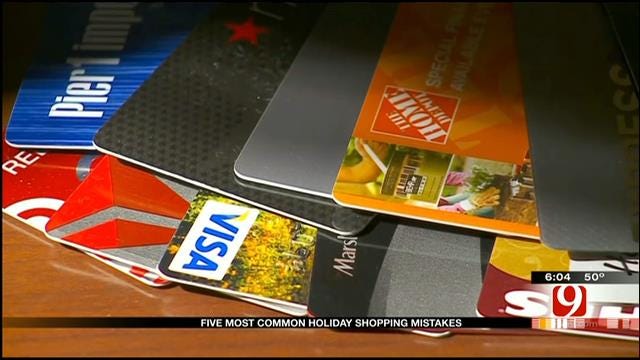5 Mistakes To Avoid When You Shop Online This Holiday Season
A lot of us will be avoiding that madness at the mall by shopping online. But if you aren't careful, buying on the internet can open you up to identity theft.Friday, November 29th 2013, 3:03 pm
A lot of us will be avoiding that madness at the mall by shopping online. But if you aren't careful, buying on the internet can open you up to identity theft.
Shoppers are expected to spend 15 percent more shopping online this year over last year. Shoppers will tell you it's more convenient. But it can also be more convenient for thieves.
"You can get everything pretty much online," Lynn Eby said as she did her shopping online Friday. "It's really crowded at the stores, I've done it every year and this year I decided not to."
But as more and more shoppers turn to the internet for their holiday purchases experts warn about the dangers.
"I'm my particular instance I'm not even sure what happened or how they got the number," said Eric Johnson, CPA, CGMA. Johnson is the Associate Dean for Administration of finance at the OU college of Pharmacy and even though frequently gives lectures on the dangers of using credit cards, he recently had his number stolen.
"They called me and warned me about some charges in Michigan."
So Eric and other Oklahoma CPA's warn of these five online shopping mistakes to avoid:
Mistake #1: Taking a chance on unknown retailers.
If you don't buy from a well-known company, or one with which you've already done business, take some precautions to ensure you can be confident of a reliable transaction. Be sure the company lists an address and phone number. Try calling the customer service number to get answers to any questions that may concern you, such as how the company handles returns, refunds and consumer complaints. You can also contact the Better Business Bureau or the State Attorney General's Public Protection Office to see if other purchasers have filed complaints.
Mistake #2: Opening unknown email links.
Don't click on links in unsolicited emails or social media sites, even if they purport to be from trustworthy retailers, because they may take you to sites that are trying to collect information for identity theft. Instead, type the organization's website address into your browser's address bar or find it through a search. Never divulge personal information—including your credit card or bank account numbers or your Social Security number—in response to an email or text message.
Mistake #3: Shopping at sites that aren't secure.
You can get a lot of clues about security simply by checking the company's website address. For example, look for URLs that begin with "https" rather than "http," because the added s indicates it is a secure website. Check also for a padlock icon in the address bar to show the site uses encryption to ensure security, and click on the lock to learn the details. Review the retailer's privacy policies, as well, to find out if they are designed to protect your credit card information or other confidential data. Remember that Internet scammers often use a name that is very similar to a reputable brand, but they alter the spelling, or they simply misspell words in their website name or communications. If something looks suspicious, don't buy from the site.
Mistake #4: Not using a credit card.
Charging the transaction allows you to dispute the purchase if it doesn't arrive or doesn't live up to expectations. At the same time, since identity theft—including the unauthorized use of credit card numbers—is growing, be sure to review your credit card statements regularly and contact the credit card issuer if you find anything that shouldn't be on your bill. Finally, when the online purchase is completed, the retailer should provide you with a receipt for your purchase that includes an order or confirmation number. Print the receipt and hold on to it or save it in a folder on your computer until you receive the product or service so that you have proof of the purchase if you need it.
Mistake #5: Shopping using a public Wi-Fi connection.
While it's fun to settle in at a coffee house and do some shopping, it's generally a bad idea. The connection you are using may not be secure, meaning that hackers may be able to gain access to the personal information you share with the retailer and use it to make unauthorized purchases.
Johnson says it's also a good idea to keep a close eye on your account.
"The credit card companies are pretty good about looking at that but sometimes it takes them a little longer to see a trend develop, where as you would know almost immediately where you went to a specific store and used that store or not," Johnson said.
Lynn says she's had her number stolen before too, and although it hasn't deterred her from shopping online, it has made her more careful.
Shoppers are expected to spend $2.27 billion shopping online this year and Cyber Monday has become one of the season's biggest shopping days.
More Like This
November 29th, 2013
March 22nd, 2024
March 14th, 2024
February 9th, 2024
Top Headlines
April 24th, 2024
April 24th, 2024
April 24th, 2024











